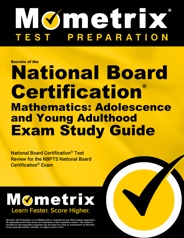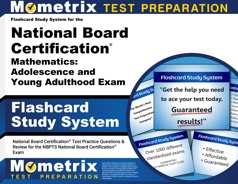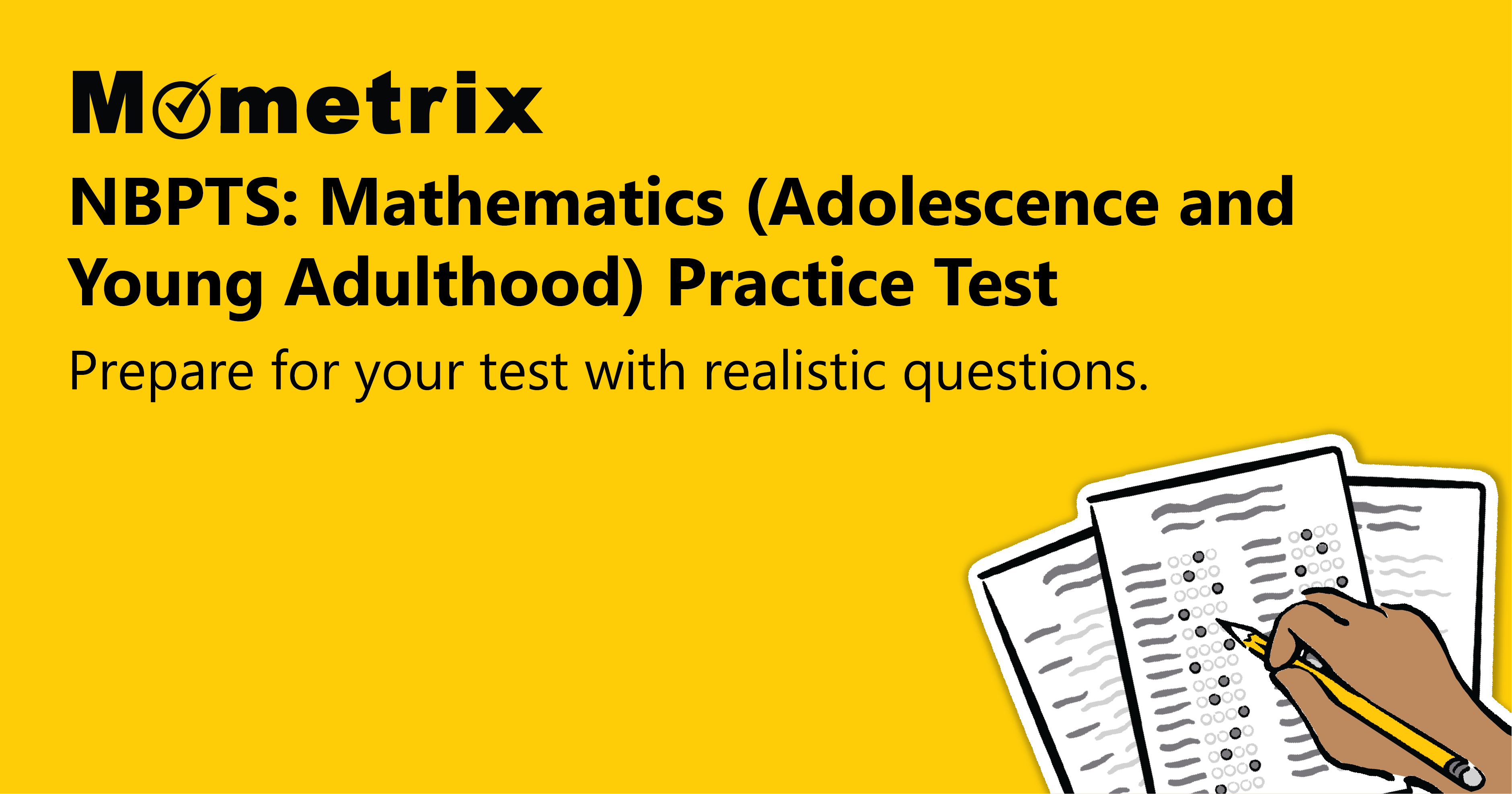The National Board for Professional Teaching Standards (NBPTS) Certification aims to develop, retain, and recognize accomplished educators while encouraging school improvement nationwide.
Spanning 16 disciplines from pre-kindergarten through 12th grade, board certification is available in 25 certificate areas. Obtaining National Board Certification is optional, but with certification comes recognition as an expert in their educational field, providing financial and career enhancement.
Click “Start Test” above to take a free National Board Mathematics practice test, and check out our premium-quality National Board Certification® test prep resources by clicking the links below!
Exam Eligibility
To obtain certification, you must have all of the following:
- A bachelor’s degree
- A valid state teaching license
- Three years of classroom experience
Part-time and long-term substitution teaching can count towards the classroom experience requirement as long as you taught under a valid state teaching license.
NBPTS allows those who haven’t met the three-year experience requirement to begin the application process as long as they fulfill this requirement by the end of their application process.
Check Out Mometrix's National Board Certification Study Guide
Get practice questions, video tutorials, and detailed study lessons
Get Your Study Guide
Certification Components
The Mathematics—Adolescence and Young Adult certification consists of four components.
Components 2-4 are part of your portfolio that you submit online.
All four components are required for certification.
- Component 1: Content Knowledge. This is the computer-based assessment where you demonstrate your understanding of knowledge and pedagogical practices in your content area.
- Component 2: Differentiation in Instruction. This portfolio entry will include selected work samples that demonstrate student growth and a written commentary where you analyze your instructional choices.
- Component 3: Teaching Practice and Learning Environment. This portfolio entry requires video recordings of your classroom engagement and a written commentary describing, analyzing, and reflecting on your interactions.
- Component 4: Effective and Reflective Practitioner. This portfolio entry requires you to demonstrate your abilities to develop and apply knowledge of your students, your ability to use assessments to plan and impact student learning, and your collaborative efforts to advance student learning and growth.
The testing window for Component 1 ranges from the beginning of March to the middle of June. The submission window for your portfolio components goes from the beginning of April to the middle of May.
Details of Component 1: The Exam
Component 1, which is the computer-based assessment, is 3 hours and 25 minutes, with one 10-minute break between the selected-response section and the constructed-response section.
You are allowed 75 minutes for the selected-response questions and an hour and a half for the constructed-response exercises (30 minutes each).
Selected-Response Section
For each question in this section, you are asked to select the best answer. Try to answer every question—guessing is not penalized.
The selected-response questions are grouped into three content categories:
- Contexts for Mathematics (15%): Subjects in this category include the historical development of mathematical ideas, mathematical applications in mathematics-related fields, and communication of mathematical ideas.
- Problem-Solving and Number Sense (40%): Topics include numbers and operations, algebra functions, and geometry.
- Modeling and Analysis (45%): The subjects in this category include trigonometry, discrete mathematics, data analysis and statistics, and calculus.
Constructed-Response Section
There are three exercises in the constructed-response section. You are allowed 30 minutes for each exercise, consisting of one or more prompts or questions.
A scenario or student profile is presented for you to consider when you answer the prompts relating to the information. Be sure to follow the directions in the prompt and answer only what is asked. The scoring assessors only evaluate your responses relating to the question or prompt. For example, if you are asked to provide two examples, do not provide three. You will waste valuable time, and the assessors will only evaluate the first two examples.
Your responses are judged on the depth and quality of your answers—grammar, punctuation, and organization are essential.
The constructed-response exercises are divided into three areas:
Using your knowledge of family functions, analyze a function’s characteristics and the relationship between a function and its inverse function. You are asked to graph a function and its inverse and discuss how the graphs are related. You will also find a symbolic representation of the inverse function and demonstrate that the symbolic representation found is the inverse function. This exercise contains one prompt.
Exercise 2: Geometry
Using your knowledge of geometry, construct a proof, explain the relationship between two geometric concepts, and express the volume of a solid generated by the rotation of a two-dimensional object on an axis. This exercise contains three prompts.
Exercise 3: Data Analysis and Statistics
Information you will analyze includes graphing given data, interpreting and modeling the data of given statistical characteristics, and estimating probabilities. You will use your data analysis and statistics knowledge to answer three prompts.
Check Out Mometrix's National Board Certification Flashcards
Get complex subjects broken down into easily understandable concepts
Get Your Flashcards
Exam Registration
Each year the NBPTS publishes “important dates and deadlines.” Create an account at the NBPTS management system website to begin your certification process. There is a $75.00 registration fee to complete your registration. Pay attention to the deadlines – if you miss a deadline, you must wait until the next registration window.
The registration fee is paid each year during your certification process.
The registration and component selection windows vary from year to year. Still, generally, the registration window opens in June or July and closes on the last day in February, the component selection deadline is the last day in February, and the computer assessment’s (Component 1) window is March to the middle of June.
Component Registration and Costs
Each of the four components has a submission deadline.
The fee for each component is $475.00, making the total cost of certification $1,900.00 (not including the $75.00 registration fee). You can pay the full fee at once or pay for each component separately, spreading the cost out over three years. Remember that you will pay the registration fee each year you are working through the certification process.
NBPTS offers a payment plan that divides the cost of your certification over six equal payments, and financial aid may be available from your state or district.
Scheduling the Component 1 Assessment
You will receive an email notification when your registration is complete and the fee is paid for Component 1. The email provides information on registering for the exam at a Pearson-Vue testing center. Testing centers are located nationwide, and testing appointments are available on a first-come, first-serve basis.
Confirmation of your testing appointment is sent by email.
How the Exam is Scored
For the selected-response questions, one point is awarded for each correct answer. Five of the 45 questions are not scored and do not contribute to your score. The number answered correctly is converted and reported on a scale of 0 to 4.25. Assessors score your constructed-response items using a 12-point rubric score scale ranging from 0.75 to 4.25.
The assessment component score is the average of the unweighted scores from the selected-response and constructed-response sections and represents 40% of your combined score. A passing score for the assessment component is 1.75. To achieve certification, you must also receive a 1.75 on each portfolio component.
Scores are released around the second week in December, and your highest score on each component is used to calculate your total score.
Retaking the Exam
You can retake any component during a five-year window, up to two times each. For Component 1, you can retake the entire component for $425.00 or the sections individually for $125.00 for the selected-response section or $125.00 per constructed-response exercise.
Preparing for the National Board Certification
National Board Certification adds weight to your experience. The certification sets you apart from other educators who have not received certification. The assessment makes up 40% of your overall score, so it is important that you do well on the exam. The lengthy and intense process requires you to be dedicated to every step.
Our National Board Certification: Mathematics (Adolescence and Young Adult) study guide and flashcards help direct your studying, so the time you spend is effective, resulting in a higher score!
FAQs
Q
What is the National Board Certification?
A
The National Board Certification is an advanced professional certification for PreK-12 educators, provided by the National Board for Professional Teaching Standards (NBPTS). The certification identifies teaching expertise through assessments that are performance-based and peer-reviewed.
Q
Can I retake the National Board Certification exam?
A
You can retake the Mathematics (Adolescence and Young Adulthood) Exam during a five-year window, up to two times each.
Q
What is a passing score on the National Board Certification?
A
A passing score on the assessment component of the Mathematics (Adolescence and Young Adulthood) Exam is 1.75. A passing score for each of the portfolio components is also 1.75.
Q
How long is the National Board Certification?
A
The Mathematics (Adolescence and Young Adulthood) Exam lasts for 3 hours and 25 minutes, with a 10-minute break between sections.
Q
How much does the National Board Certification exam cost?
A
The Mathematics (Adolescence and Young Adulthood) Exam contains four components. The fee for each component is $475.00, making the total cost of certification $1900.00 (not including the $75.00 registration fee).
Q
When will I receive my test scores?
A
You will receive your test scores around the second week in December.
National Board Certification is a registered trademark of National Board for Professional Teaching Standards, Inc. Mometrix Test Preparation is not affiliated with the National Board for Professional Teaching Standards (NBPTS), nor are Mometrix products and publications endorsed by or approved by NBPTS. Mometrix has not received confidential information or assistance from NBPTS, its assessors, or National Board Certified Teachers in developing its products and publications.



